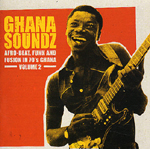|
|
 |
Dusted Reviews
Artist: V/A Album: Ghana Soundz 2 Label: Soundway Review date: Jan. 11, 2005 |

|
|
|
 |
Ghana Soundz: Afro-Beat, Funk and Fusion in 70’s Ghana Volume 2, the second volume of funk and other styles from Ghana compiled by DJ Miles Cleret for Soundway, doesn’t just continue the groove exploration that began with the first volume. More than anything, this new collection goes a long way to dispel the simplistic notion that the myriad sounds emanating from Ghana (and the rest of West Africa) in the 70's were little more than a reflection of what James Brown and Fela were doing. In fact, the palette of sounds on Volume 2 (a broader selection than the first volume) knocks down altogether the Western, postcolonial view that Africans are doing little more than reinterpreting American soul music.
While Ghana may have gained its independence only three years before Fela’s native Nigeria, it had previously served as seat for empires, and only as an artificially-conceived nation – drawn by Europeans – did Ghana come to include as many as 45 different ethnicities, each with its own language and identity. The galloping funk of much West African soul music, attributed by lesser-reads as something Fela or Tony Allen concocted after seeing James Brown on television, is more likely rooted in the thousands of years that predated the arrival of the British or any other Western influence. Maybe it’s a Yoruba thing: today they are Nigeria’s third largest ethnic group, but at one time the land of the Yoruba – Fela’s ethnic origin – stretched all the way into Ghana. Regardless, tags like “Afro-beat,” whether or not they are embraced by Ghanaians the same way they are bandied about by limey DJ’s or wannabe ethnomusicologists, barely get out of the blocks in providing any insight to what Ghana Sounds...2 delivers.
Opening track “Olufeme,” by Oscar Tulley and The Uhuru Dance Band (featured, like several others on this installment, on the original Ghana Soundz compilation) kicks off with about eight measures of familiar grit, replete with the double-tap martial snare work that featured so prominently on Fela’s live set with Ginger Baker, centered around a bluesy brass workout. Quickly, though, the song ascends above the bassy groove with Tulley’s soaring vocals, a flute solo, and other touches that balance the tough-as-nails rhythm section. With this track and almost every other, the richness and freedom of melody speak as much to the postcolonial Ghanaian identity as they do the uniqueness of the music itself. The funk is just the point of departure: songs by Ebo Taylor and Joe Mensah showcase a similar willingness to build on a masculine groove by incorporating more flowers and colors, almost adding a sense of femininity.
Much of the color from this era in Ghana comes from the instrumentation itself. In addition to the layers of percussion – disco handclaps and bongos, for example – and second-generation high-life guitar sounds, Volume 2 makes the argument that for every recording studio in Ghana, the Farfisa rep made a sale. The shrill reediness of the Farfisa organ gets old quickly on a Hives record, but in the context of ’70s Ghana, it adds another counterpoint to distinguish the rolling funk as something celebratory and emotional. On “Samarin Bolga,” by Uppers Chapter 2 (Ghanaian English is even more fun than Japanglish,) the singer pushes the high end of his range through lilting syncopated passages that display compositional artistry as well as passion. The song closes with a flourish of trumpet work that wouldn’t be out of place on a Lee Morgan record.
While some of the music occasionally sounded exotic or novel on the first Ghana Soundz collection (including songs like “Psychedelic Woman” by Honny & The Bees Band), there is a consistency to the sounds on Volume 2 that implies this is no novelty. However, if there is one song that stands out for it’s defiantly African, if not downright folkloric, sound, it’s Christy Azuma’s track with Uppers International, “Naam.” Equally evocative of the extended harmonies in some Ethiopian and Arabic music, Azuma’s voice (often in the same stratosphere as Minnie Ripperton’s) hints at the album’s widest range of emotions and ideas: Sung in one of Ghana’s many languages, the staunchly traditional voice, mournful but not without hope and joy, rides easily on top of the 6/8 shuffle and wah-wah guitar, forming a bridge between a uniquely Ghanaian identity and the contemporary sounds of the rest of the world’s soul and groove music.
By Andy Freivogel
|







